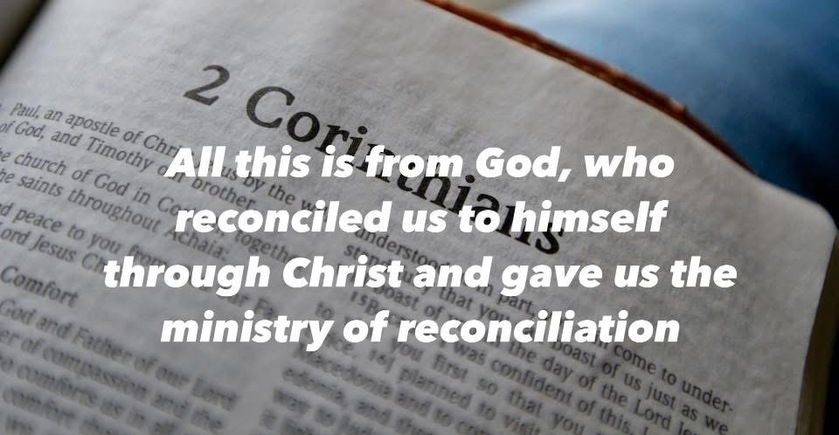When Relationships Fail, Christ Remains: A Journey to Peace
John 14:1-4
"Let not your hearts be troubled. Believe in God; believe also in me. In my Father's house are many rooms. If it were not so, would I have told you that I go to prepare a place for you? And if I go and prepare a place for you, I will come again and will take you to myself, that where I am you may be also. And you know the way to where I am going."
In a world of temporary shelters, our homes, our bodies, our earthly lives, and our human purposes, Jesus offers us an unshakable promise: a place prepared for us in the Father’s house, a building from God, eternal and not made with human hands. This divine assurance anchors our hope, transforming how we face life’s uncertainties and burdens. He paints a picture of a heavenly home with "many rooms," a place He is personally preparing for us. And the way to this eternal home? Jesus Himself, the way, the truth, and the life (John 14:6).
The Apostle Paul expands on this hope. He reminds us that God has prepared something far greater, a heavenly dwelling that will "swallow up" our mortality with life.
2 Corinthians 5:1-5
"For we know that if the tent that is our earthly home is destroyed, we have a building from God, a house not made with hands, eternal in the heavens. For in this tent we groan, longing to put on our heavenly dwelling, if indeed by putting it on we may not be found naked. For while we are still in this tent, we groan, being burdened; not that we would be unclothed, but that we would be further clothed, so that what is mortal may be swallowed up by life. He who has prepared us for this very thing is God, who has given us the Spirit as a guarantee."
Like Paul, we groan for the day when we will be "further clothed" in our heavenly dwelling, free from the burdens of this world. Finally, it empowers us to live with purpose. The Spirit within us is a reminder that God is preparing us for eternity, even as He prepares a place for us.
What troubles your heart today, and how can Jesus’ promise in John 14:1-4 bring you peace?
As for me I am troubled by the futility of so many of our relationships with people who are our friends and family. The peace I seek is love and life in Christ. Not in the ephemeral world of pretense, but in holiness, honesty, and truth. I don't want anger, and wrath. I want peace and joy. My heart truly is troubled. I'm longing for something permanent amid life’s fragility.
Relationships, even with those we love, can fall short of the depth and authenticity we crave because they are shaped by human imperfection and the temporary nature of this world. And I know that God is not angry, even when I'm angry, the Lord is the Lord. As his child I am not being Him, especially when I'm being unkind and mean-spirited. And I know this.
Jesus’ words in John 14:1, "Let not your hearts be troubled," is a direct invitation for me to anchor my troubled heart in trust, trust in God and in Him. And I don't trust him with my life as much as I think I do. The peace I seek, is grounded in "love and life in Christ". Which is precisely what Jesus offers through the promise of a prepared place in the Father’s house. And I know that this place he is preparing is not just a future destination but a present reality that shapes how I navigate relationships now. So why am I failing to appreciate this?
What do I know?
I know that when friends or family disappoint, I can rest in the truth that Jesus is preparing a place where love is unbroken, and relationships reflect His perfect truth and holiness. The Spirit empowers us to embody holiness and honesty in our relationships, even when others remain caught up in pretense and dishonor.
The world’s pretense: its superficiality, hidden motives, and fleeting loyalties, cannot satisfy a heart made for eternity. Jesus’ promise to "come again and take you to myself" (John 14:3) frees me from chasing after validation in temporary human connections. Instead, I can root my identity in Christ, who knows me and my truth fully and who loves me perfectly. This security allows me to approach relationships with authenticity, offering love without fear of rejection, because my true home is with Him.
So why do I get angry?
When feelings of futility arise, meditate on John 14:1-4. Picture Jesus preparing your place in the Father’s house, a home free from pretense and filled with His love. Let this image calm your heart, reminding you that your ultimate relationship is with Him. When interacting with friends or family, pray for the Spirit to guide your words and actions, helping you reflect Christ’s love even in difficult moments. Instead of focusing on the futility of human connections, view them as opportunities to reflect Christ’s eternal love. Even if others don’t reciprocate, your faithfulness in loving them mirrors Jesus’ sacrificial love. When anger or wrath surfaces, bring it to Jesus, the Good Shepherd who laid down His life for you. Acknowledge your hurt and surrender it, trusting that He is enough to heal your heart.
Food for thought:
Moses’ failure at Meribah (Numbers 20) illustrates the danger of letting temporary frustrations; anger, pride, or unbelief, disrupt our trust in God’s eternal promises. Just as I expressed frustration with the "futility" of our relationships marked by pretense, Moses’ anger reflected a momentary lapse in trusting God’s provision, leading to ungodly contempt. His story warns us to guard our hearts against reacting to relational strife with wrath, instead seeking the peace and holiness found in Christ, the true Rock. Moses’ anger led him to act in ways that dishonored God, costing him entry into the Promised Land. Similarly, when relational frustrations provoke anger or contempt toward others, it can obscure God’s holiness in us, damaging our witness and peace. I can understand why Moses did what he did. Forty years he spent with these people who habitually lived in their selfishness and sin. And he pretty much had had enough. He was done with them and their nonsense. But instead of striking out at the rock in frustration, he should have spoken to the Rock—Christ—through prayer, trusting His provision for his relational needs.
The rock holds symbolic significance, as Paul later identifies it with Christ:
"They drank from the spiritual Rock that followed them, and the Rock was Christ" (1 Corinthians 10:4).
In Exodus 17, striking the rock prefigured Christ’s crucifixion, where He was "struck" to provide life-giving salvation. In Numbers 20, speaking to the rock, rather than striking it, would have symbolized accessing God’s grace through prayer and faith, not violence. Moses’ act of striking the rock in anger distorted this interpretation, undermining the picture of God’s gracious provision through Christ. This failure to trust God’s method and to reflect His holiness ties directly to the theme of unbelief in Numbers 20:12.
Have you ever seen your anger and troubled hearts as unbelief?
That's what's being taught here. In times of testing God draws nearer to us, building and shaping our character in preparation for his kingdom. We know the story is progressing towards His kingdom, but somehow, still, we lose sight of His eternal perspective.
The story of Moses striking the rock in Numbers 20:10-12 illustrates how anger and a troubled heart can manifest as unbelief. God’s verdict reveals that Moses’ anger was not just a momentary lapse but a failure to trust God’s method and character. By striking the rock instead of speaking to it, Moses doubted the sufficiency of God’s command, distorting the picture of Christ’s gracious provision (1 Corinthians 10:4). This unbelief was rooted in his frustration with the people’s grumbling, which clouded his reliance on God’s sovereignty. He wasn't wrong about the people, they were jerks, that's a given, but he was wrong about how he handled God's love.
Oh boy can I relate with Moses right now.
Instead of trusting God’s process, we may "strike out" in frustration, seeking control or validation in ways that dishonor Him. It may often be the case that in our attempts at striking down dishonor we end up dishonoring God. For example, when a friend’s pretense or a family member’s rejection stirs anger, it’s tempting to react with harsh words or withdrawal, much like Moses’ double strike on the rock. This reaction may often stem from doubting God’s ability to work in the situation or His promise to provide peace and purpose (John 14:1-3). It's a kind of unbelief. Like Moses, we fail to "uphold God’s holiness" in our impatience by not reflecting His patience and grace, revealing an unbelief that God is building something eternal through our trials.
Just as Moses’ anger led to unbelief by doubting God’s method, my troubled heart may reflect moments of unbelief when I doubt God’s ability to provide the promised family, redeem broken relationships or provide the peace I seek. And so, we rest in The Holy Spirit, our "guarantee" (v. 5), assuring us that God is at work, even when our relationships feel barren.
When anger arises in your relationships, pause and ask, "Where am I doubting God’s control or provision?" Reflect on Numbers 20:12, pray, "Lord, forgive my unbelief. Help me trust Your method, like speaking to the Rock."
Instead of "striking out" with harsh words or resentment, pray to Christ, your Rock (1 Corinthians 10:4). Ask for His living water to fill you with peace and love, enabling you to respond to pretense with holiness. Pray, "Jesus, my Rock, pour out Your grace in this relationship. Shape me for Your kingdom."
When relationships feel futile, recall the "many rooms" in the Father’s house (John 14:2). This eternal perspective can calm your heart, reminding you that God is building something lasting through your trials. And when faced with pretense, ask the Spirit to guide your words and actions, fostering truth and joy rather than wrath.
Eternal Truths:
Anger often signals unbelief, a failure to trust God’s sovereignty and grace.
A genuine longing for peace and holiness reflects a heart attuned to The Father's process, seeking Christ’s transformative love.
Recognizing the need for this recreation in faith is a sign of a regenerated creature who is not narcissistic. A narcissistic response clings to anger or demands validation, but a regenerated heart trusts God’s process, seeking His glory over personal comfort. The Spirit’s presence assures us that God is building a "house not made with hands" (2 Corinthians 5:1), freeing us from self-centeredness to love others selflessly.
Selfless love, as modeled by Jesus, is sacrificial and seeks the good of others regardless of their response (John 13:34-35). To love selflessly, we must rest in the Holy Spirit’s "guarantee" (2 Corinthians 5:5), trusting that God is shaping us for His eternal kingdom, even when relationships feel barren. Pray for those who wrong you (Matthew 5:44) and surrender resentment. Unbending rejection often fuels grudges, but forgiveness breaks this cycle. Pray for their heart to soften, trusting God’s timing.
Selfless love acts for others’ good, not to win their acceptance. Reflect Christ’s love, even if rejected. A regenerated heart isn’t narcissistic; it loves without demanding reciprocation, trusting God sees your efforts (Micah 6:8). When pretense or hostility tempts you to anger, ask the Holy Spirit to guide your response. Recognize that others’ rejection reflects their choices, their free will, not your failure. Love them by praying for their hearts but release the burden of changing them.
Selfless love doesn’t mean enduring abuse. Like Daniel’s resolve, stand firm in faith while protecting your peace. If someone’s rejection is toxic, limit contact prayerfully, loving from a distance. Separate yourself from the temptation of your flesh. And seek instead trusted friends or mentors who reflect Christ’s love, supporting you in loving the unyielding.
Selfless love doesn’t depend on reciprocation. It flows from trust in God’s redemptive plan, like Jesus’ assurance of a prepared place in John 14:2-3.
Prayer: Father, when rejection tempts me to anger, fill me with Your Spirit’s grace. Help me love selflessly, trusting Your eternal plan. In Jesus’ name, Amen.




















